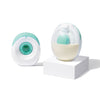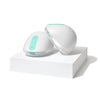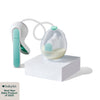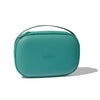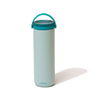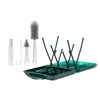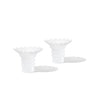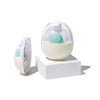
TL;DR
Your baby has specific ways of telling you they’re hungry or full. Look for these cues:
|
Still Hungry Signs: |
Full & Satisfied Signs: |
|
|
Remember: Track wet diapers (6+ daily) and weight gain for long-term reassurance. Every baby is different - you'll learn their unique signals!
You probably know babies need lots of food and nutrients to grow, but how much is really enough? And how can you tell if your baby is actually getting enough food from those seemingly endless breastfeeds?
If you’re breastfeeding, it can be tough to judge exactly how much milk your little one is actually getting and whether what they’re getting is enough. The good news is it’s normal for your baby’s appetite to fluctuate a little from the ebb and flow of growth spurts. However, if you’re worried, this article is for you! We’ll cover some of the common signs your baby is still hungry or full after a feeding.
Signs Your Baby is Still Hungry After Breastfeeding
If you’re exclusively breastfeeding, you can’t just look at your boob and say “yep, Sally’s had 1 ounce this round.” If you’re not sure whether your feeds are going as they should, you’re not alone. If you’re worried, look for these signs towards the end of a feeding to get an idea of if your baby’s still hungry.
Smacking or Licking Lips
Smacking or licking lips is a common general sign that your baby is feeling hungry. If you finish a feed and your baby is still smacking or licking their lips, first off, don’t freak out — lip smacking and licking is a common thing for babies to do, not only when they’re hungry. Your baby may just like experiencing the sensation and find it soothing.
However, if the lip smacking post-feed comes before crankiness, rooting (moving head from side to side as though looking for a breast), anxious movements, or crying, you might want to consider offering the nipple again to see if they’d want a top off. Bottom line with this sign: keep an eye on it. It may not mean anything on its own, but if a pattern comes up, it may help you understand what your baby needs.
Being Fussy or Crying Sporadically
Generally, mom’s milk will have a calming effect on the baby. Hey, who doesn’t get sleepy after a big meal? Not only that, breastmilk can actually have natural hormones that help calm the baby and help them sleep.
If this isn’t happening or if your baby still seems to be fussy and crying post feed, it could be a sign that they didn’t quite fill up. That being said, there are a lot of other reasons why your baby may be fussy or crying after feeding — they could need to burp, have a dirty diaper, or have colic.
If your baby is crying, try to soothe and calm them down, then offer a breast to see if they’re interested in feeding again.
Pointing or Looking at Food
As your baby gets older, they’ll develop different signs to tell you they’re hungry. One of those common signs? Pointing or looking at food. Your little one may make a variety of different hand motions or sounds that mean “mom, more please!”
They Receive Small Amounts of Milk at a Time
Especially in the newborn phase, it can take a bit of time for your body to start producing the right amount of milk for your baby and for your baby to get used to getting a good latch. Don’t stress it too much — your newborn can’t have too much milk in one sitting to begin with anyway because of their tiny belly!
However, that tiny belly means those feedings are more frequent and your baby may be hungry again only an hour or two after a feed.
Plus exclusively breastfeeding can make it difficult to judge exactly how much milk your baby is getting, meaning it can be easy to feel that your little one isn’t getting enough. You might not be able to get out the measuring cup, but you can watch your baby when they drink and get an idea of how much milk they’re actually swallowing. If they seem to be struggling to latch or don’t seem to be swallowing much milk, don’t panic — it may just be something to watch and talk to your pediatrician if it continues.
(P.S. If you’re super concerned about your milk supply, you can use different foods to try to increase milk production.)
Increase in Movement or Stretching
Another common sign that your baby’s hungry is moving around or stretching. If your baby is still stretching and moving around as though looking for the boob, they may still want a bit more food.
Signs Your Baby is Full at Feeding
Now, the opposite end of the spectrum — your baby’s full! Just as you don’t want to stop a feeding before your baby’s ready, you also don’t want to force more feeding if your little one isn’t feeling it. These cues may help you know your baby’s getting enough at each feeding.
They Turn Their Head Away When Being Offered Food
When your baby’s full, they won’t want to eat anymore. (Simple, right?) If they turn away from the breast, close their mouth, or let go of the nipple (without wanting it back), there’s a good chance your baby’s done.
They Are Going Through Diapers Quickly
While you won’t see this directly after a feed, if your baby is having regular bowel movements and needing fairly frequent diaper changes, that’s a good sign. It means your baby is digesting enough to have waste to get rid of.
The exact amount of diapers will change depending on how old your baby is and your baby’s specific situation. The number of diapers will likely decrease slightly with age because their little bodies can hold more. Anything from 8 to 12 diapers in a day is normal for newborns and 8 to 10 for up to 4 months.
Using Hand Motions and Sounds to Indicate Fullness
Your baby develops their own ways to communicate their needs with you far before they start talking and signaling they’re full is no different. As your little one gets older, pay attention to any hand motion patterns or sounds that they typically make towards the end of a feeding.
Along with active hand motion and sound signals, your baby may also show they’re full through a lack of hand motion! Your baby’s hands may become more relaxed, opening out of a fist, and even becoming limp as though starting to fall asleep.
When to Seek Further Guidance
While these cues are excellent guides, always trust your instincts. Contact your pediatrician or a lactation consultant if you notice:
- Persistent lethargy or lack of energy.
- Insufficient wet diapers (a sign of dehydration).
- Consistently poor weight gain or weight loss.
- You feel overwhelmed or your baby seems constantly unsatisfied.
Stay in the Know with Willow
Feeling prepared to clock your baby’s hungry and full signals while feeding? We’ve provided a few common signs that your baby may still be hungry or that they’re happily content. However, if your baby isn’t showing these specific signals or you’re struggling to notice them, don’t stress it, mama.
Every baby is different and yours may have different ways of telling you what they need! At the end of the day, the most clear way you can tell if your little one is getting enough food is if they’re consistently gaining weight and making their growth benchmarks.
Have patience. Be kind to yourself. You got this.
FAQs:
-
How can I tell the difference between hunger cries and other cries
A hunger cry is often more rhythmic and persistent, and it may be preceded by other hunger cues like lip-smacking or rooting. A cry of pain is often sharper and more sudden, while a tired cry may be more whiny. You'll learn your baby's unique "hunger language" over time. -
My baby seems to want to feed all the time. Is this cluster feeding?
Yes, this is very common and known as cluster feeding. It often happens during growth spurts or in the evenings. It’s your baby's way of increasing your milk supply. As long as diaper output and weight gain are on track, this is normal behavior, not a sign of insufficient milk. -
Can a pacifier mask hunger cues?
It can. A pacifier satisfies the innate sucking reflex, which may temporarily calm a hungry baby and delay feeding. If you're unsure if your baby is hungry, it's always best to offer the breast first to see if they want to feed. -
How does responsive feeding support long-term health?
Responsive feeding—answering hunger and fullness cues—helps babies learn to self-regulate their appetite. This healthy relationship with food can reduce the risk of overeating and obesity later in life.
Feed with Confidence and Real-Time Data
Decoding your baby's signals is a skill that takes time and patience. While the cues above are a fantastic guide, wouldn't it be empowering to know exactly how much milk your baby has consumed during a feed?
The Willow Smart Wearable Breast Pump is more than just a pump; it's your partner in the feeding journey. With the accompanying app, you can:
-
Track milk volume in real-time for each session, eliminating the guesswork.
-
Monitor your pumping history to identify patterns and ensure your baby is getting enough.
-
Pump hands-free and discreetly, giving you the freedom to move while nourishing your baby.
Stop wondering and start knowing. You got this, mama—and Willow has you.
Get pumping support with Simplifed
Get access to free virtual feeding support from the lactation consultants at Simplifed. They can help you navigate supply issues, introduce a bottle, and more, and are trained on Willow pumps.
Tags Used
